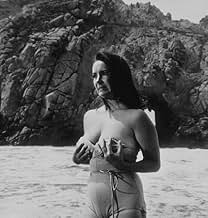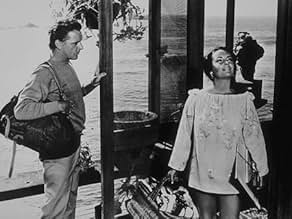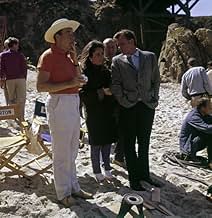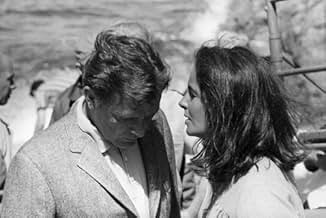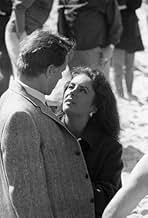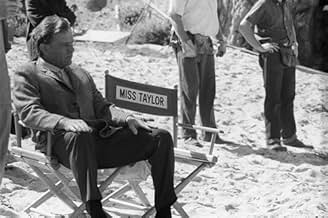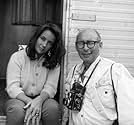Füge eine Handlung in deiner Sprache hinzuA free-spirited single mother forms a connection with the married headmaster of an Episcopalian boarding school in Monterey, California.A free-spirited single mother forms a connection with the married headmaster of an Episcopalian boarding school in Monterey, California.A free-spirited single mother forms a connection with the married headmaster of an Episcopalian boarding school in Monterey, California.
- 1 Oscar gewonnen
- 3 Gewinne & 3 Nominierungen insgesamt
- Phil Sutcliff
- (as Doug Henderson)
- Trooper
- (Nicht genannt)
- Trustee's Wife
- (Nicht genannt)
- Celebrant #9
- (Nicht genannt)
- Trooper
- (Nicht genannt)
- Celebrant #7
- (Nicht genannt)
- Walter Robinson
- (Nicht genannt)
- Trustee
- (Nicht genannt)
Empfohlene Bewertungen
"The Sandpiper" begins with a VERY free-spirited mother (Elizabeth Taylor) being hauled into family court because her young son has had another brush with the law. The problems are not serious but the judge is shocked that Taylor is so unrepentant in the way she raises the kid. She's an atheist, is extremely permissive and home schools the boy with her own blend of unusual teaching. Nowadays or even in the late 60s, this sort of child raising wouldn't have gotten much notice (particularly in California)--but here in 1965 it's a bit scandalous--especially since Taylor's character never married nor does she care about legitimizing the boy. Because of this and the child's actions, he is sent to live at a nearby residential school run by the church. Taylor thinks that the Episcopal priest running the place (Richard Burton) is shocked by all this and immediately dislikes him, but he seems rather patient and caring. However, through the course of the film, the two begin to see each other more and more and it's apparent that soon the two will be hitting the sheets together--even though he's married (to a woman, not just God). What's to come of these two? See the film if you'd like.
Apart from the great location shooting, the film is a mixed bag. Some would clearly be offended by its irreverent plot, others bored (as it's VERY talky at times and the dialog becomes awful at about 80 minutes into the film) and others would love it. Those who like really salacious soaps of the era (such as "Peyton Place" and the like) will probably adore the film--as it is filled with fiery content (not just the affair but an attempted rape) and a good looking couple (well, at least Liz). And, in many ways, these same folks often felt like they were peering into the real life relationship between this couple. As for me, I loved the scenery and laughed at the love story. It seemed contrived and you wondered just how any priest could be that stupid. Plus, the dialog between Liz and Dick on the beach was pretty laughable as was the fight at the 106 minute mark and Dick's sermon towards the end. I see the film as a guilty pleasure you see once...and only once. Then, afterwords, to make penance for this, you should watch a really GOOD film!
By the way, despite the name, San Simeon School is supposed to be in nearby Monterey (just north of Big Sur) and has no relation to the Hearst mansion (San Simeon) a couple hours south. Also, I was impressed by a supporting role by James Edwards. For a black actor, it was a great role--a non-black and non-stereotypical role. For its era, it was ahead of its time.
Minnelli must have cast Burton for the role after Huston's success with Burton in "Iguana". Taylor's agnostic rebellious life and Burton's religious moral life explode on contact and tower over all the other actors in this movie. Though Minnelli is respected for his direction, this effort of his will not be considered a major work.
Eva Marie Saint's role is elegant but not developed beyond the obvious--where are her sons mentioned in the dialogues? What's her relationship with them? Minnelli obviously took interest in the main plot, not the subplots--which is strange for an accomplished director.
The screenplay at times is very strong, e.g., with Burton's clever intonations of his repartees quoting the "Book of Proverbs" and the young child innocently reciting Chaucer in "Olde English". In retrospect the film had good tools: a good script and a good cast. But the tools in the hands of Minnelli did not sculpt a great Kara statue.
Unfortunately, "or not" is a very distinct possibility. First of all, the boy in question does not exude a persona that's engaging in any way. (And what he does in his first scene certainly does not endear him to the audience.) And secondly, there's nothing really compelling enough about any of the other characters either. (Eva Marie Saint's character would be a possible exception if she had more screen time.) They're just varying degrees of liberal and conservative clichés.
While Vincente Minnelli was really incapable of making a truly awful film, given his talent--and the talent we would see in Taylor and Burton the following year in Who's Afraid of Virginia Woolf?--this can't be seen as anything but a disappointment. But it's not a total failure either. If you're initially interested, Maybe you'll stay with it. If not, you'll be totally bored.
Note: This film gave us the Oscar-winning song, "The Shadow of Your Smile." But none of the characters smile much, so it makes little to no sense when the Studio Singers perform it over the end credits. But it works as a score.
Wusstest du schon
- WissenswertesRichard Burton tried to get out of making this movie but he was under contractual obligation.
- PatzerClaire Hewitt tells her husband that Danny "was reciting the Prologue to Chaucer's Canterbury Tales in Old English." The language Chaucer wrote in, and that Danny recites in, is Middle English, not Old English.
- Zitate
Laura Reynolds: [they're on the beach, along the Big Sur] I feel as alone as Robinson Crusoe. Even with the footprints of a man beside me.
Dr. Edward Hewitt: You should always have a man's footprints beside you, Laura.
Laura Reynolds: How do you know I haven't always?
Dr. Edward Hewitt: Because you're afraid of them...
Laura Reynolds: But I'm not as afraid as you think.
Dr. Edward Hewitt: Do you think that one of these days Danny's going to feel somehow that you robbed him of a father?
Laura Reynolds: Well, that's a chance I'm gonna' have to take. Do you know something? If I were a devoted widow, and Danny's father were a dead war hero, would you be pitching me this bit about finding a second father to replace the dead one?
Dr. Edward Hewitt: Touché.
- VerbindungenFeatured in Elizabeth Taylor - An Intimate Portrait (1975)
- SoundtracksThe Shadow of Your Smile
Music by Johnny Mandel
Lyrics by Paul Francis Webster
Performed by Jack Sheldon
Top-Auswahl
Details
Box Office
- Budget
- 5.300.000 $ (geschätzt)
- Laufzeit1 Stunde 57 Minuten
- Seitenverhältnis
- 2.35 : 1
Zu dieser Seite beitragen



